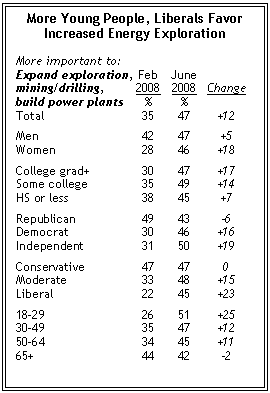
Amid record gas prices, public support for greater energy exploration is spiking. Compared with just a few months ago, many more Americans are giving higher priority to more energy exploration, rather than more conservation. An increasing proportion also says that developing new sources of energy — rather than protecting the environment — is the more important national priority.
The latest nationwide survey by the Pew Research Center for the People & the Press, conducted June 18-29 among 2,004 adults, also finds that half of Americans now support drilling in Alaska’s Arctic National Wildlife Refuge, up from 42% in February.
The public’s changing energy priorities are most evident in the growing percentage that views increased energy exploration — including mining and drilling, as well as the construction of new power plants — as a more important priority for energy policy than increased conservation and regulation. Nearly half (47%) now rates energy exploration as the more important priority, up from 35% in February. The proportion saying it is more important to increase energy conservation and regulation has declined by 10 points (from 55% to 45%).

In surveys dating to 2001, majorities or pluralities had consistently said that greater energy conservation and regulation on energy use and prices was more important than increased energy exploration.
Partisan Gap over Energy Exploration Disappears
Much of the increase in support for energy exploration has come among groups that previously viewed this as a less important priority than energy conservation — young people, liberals, independents, Democrats, women and people who have attended college.

Fully half of people ages 18 to 29 (51%) now say expanding energy exploration is a more important priority for energy policy than increasing energy conservation and regulation; only about a quarter of young people (26%) expressed this view in February. The proportion of liberals who say expanded energy exploration is the more important priority also has doubled (from 22% to 45%).
The gender gap in attitudes about whether greater exploration or greater conservation is the more important priority has disappeared, as women have become much more supportive of expanded exploration (up 18 points).
Similarly, more independents (19 points) and Democrats (16 points) view increased energy exploration as the more important priority. About the same proportions of Democrats (46%) and Republicans (43%) now say expanded exploration, rather than increased conservation, should take precedence; in February, far more Republicans than Democrats expressed this view.
ANWR Drilling Still Politically Divisive

In contrast with overall opinions about energy exploration, views about drilling for oil and gas in ANWR remain politically divided. As was the case in February, about twice as many Republicans as Democrats favor drilling in ANWR (75% vs. 36%). Support for oil and gas drilling in the Alaska wildlife refuge has increased sharply among Republicans (12 points), but only modestly among Democrats (five points).
Support for ANWR energy drilling has increased across age groups, but Americans ages 65 and older continue to support this at much higher levels than do those younger than 30 (62% vs. 37%). More women favor ANWR drilling than in February, but women continue to be less supportive of drilling for oil and gas in the Alaska wildlife refuge than men (45% vs. 56%).
Iraq War Views Stable
Public opinion about the war in Iraq has changed little over the past few months. A narrow majority (52%) says that the U.S. military effort is not going well; 44% say things in Iraq are going very or fairly well. That is identical to the balance of opinion in April; in February, a slightly greater percentage (48%) said things were going well in Iraq.

The public also remains divided about whether to bring home U.S. troops as soon as possible (52%), or keep them there until the country is stabilized (43%). As in previous surveys, most of those who support a troop withdrawal from Iraq say it should gradual rather than immediate (35% gradual vs. 16% immediate).
By 50% to 42%, more Americans believe that the United States will succeed, rather than fail, in achieving its goals in Iraq. In April, opinion about whether the United States will succeed was a bit more closely divided (47% definitely/probably succeed vs. 46% definitely/probably fail).
As has been the case since October 2007, a majority of Americans (55%) believe the United States made the wrong decision in using military force in Iraq. Just 39% say the war was the right decision.
Find a description of the survey methodology and the topline questionnaire at pewresearch.org/pewresearch-org/politics




